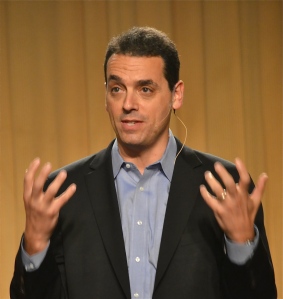More Real World Business Advice
As faulty as business-to-school comparisons can be, there are some guiding principles that can apply in both realms, especially if we set aside the serious differences in mission and resources, and focus on interpersonal dynamics in complex organizations. Authors like Dan Pink (left), Bob Sutton, and Samuel Culbertson offer insights that are not drawn specifically from schools, but speak to the motivations and goals of educators. Inyesterday’s blog post, I mentioned that the Sunday Business Section in the New York Times (3/18/12) had a couple of articles that had useful applications to education, and that it would be nice if business-minded education reformers would actually apply this kind of thinking to policies they advocate in schools. I went on to discuss a business consulting service that helps executives work more effectively with employees by paying attention to personal styles and habits.
As promised, today’s post features Exhibit B from yesterday’s New York Times Business Section: “Can’t Admit To Failure? Don’t Apply” – an interview with Tracy Matura, General Manager of the Smart car unit at Mercedes-Benz USA. Surely the automobile business is a “real world” workplace, populated by executives who are data-driven, results-oriented, objective and concrete. And yet, Matura’s lessons in leadership and management
As promised, today’s post features Exhibit B from yesterday’s New York Times Business Section: “Can’t Admit To Failure? Don’t Apply” – an interview with Tracy Matura, General Manager of the Smart car unit at Mercedes-Benz USA. Surely the automobile business is a “real world” workplace, populated by executives who are data-driven, results-oriented, objective and concrete. And yet, Matura’s lessons in leadership and management

